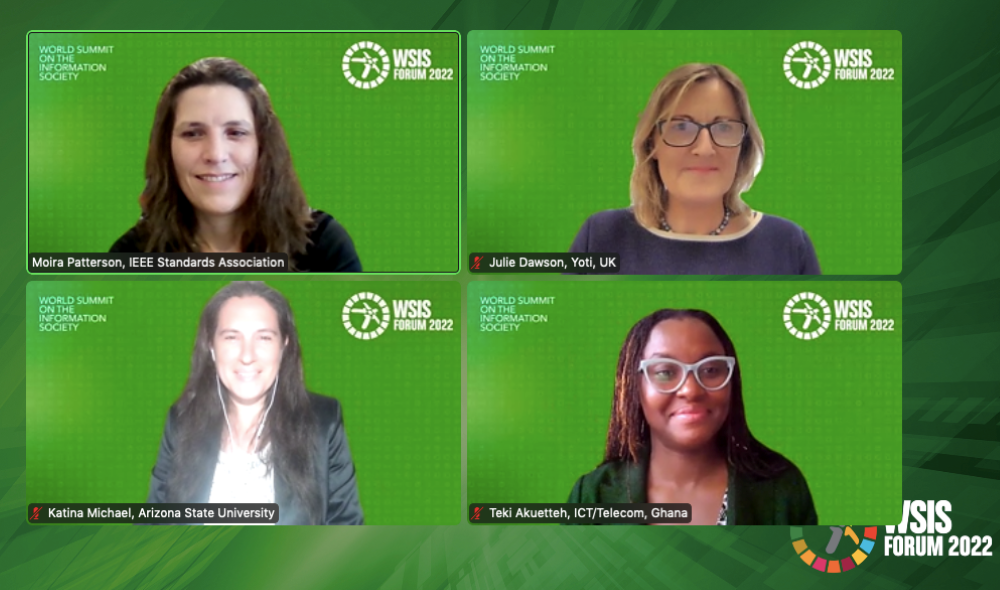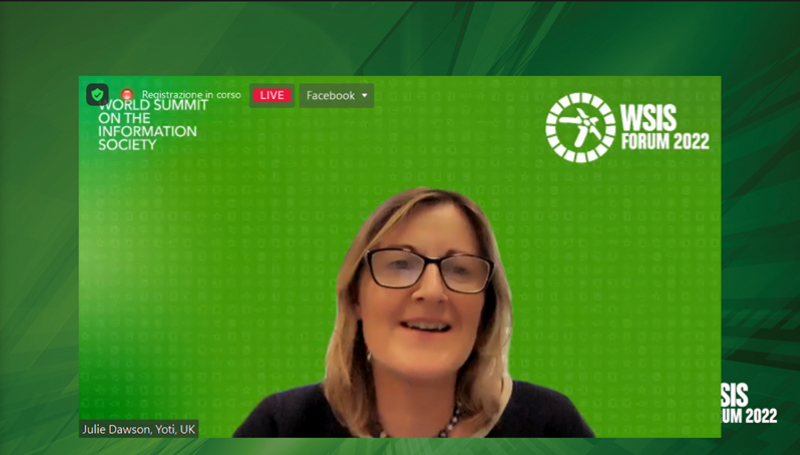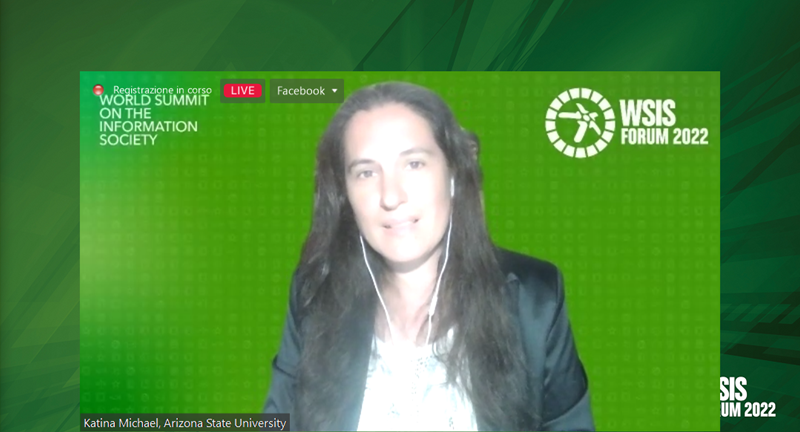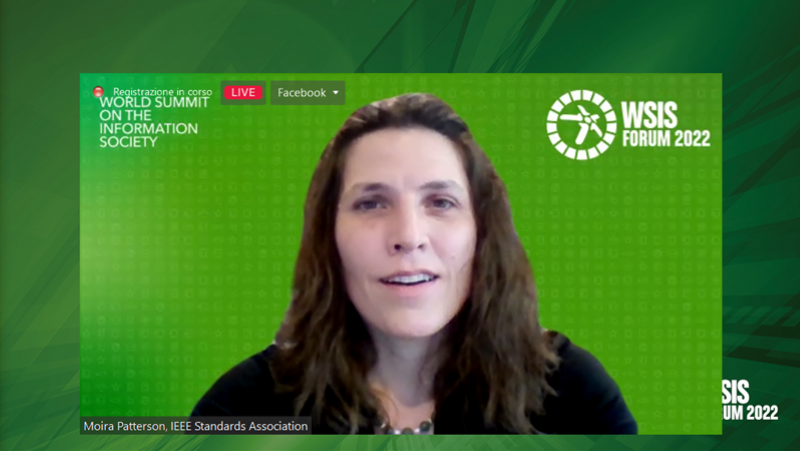Is it technically possible to make the digital world age appropriate?
Institute of Electrical and Electronics Engineers, Inc. (IEEE)
Session 316
Online products and services can provide tremendous benefits, such as social connection to loved ones far away, information from around the world, and learning opportunities for underserved communities, as well as risks, such as manipulation, misinformation, and reputational harm, so it is critical to better design digital products and services to maintain the human rights and thriving of children. In this workshop, participants will hear about practical aspects of making the digital world age appropriate and how thoughtful approaches can enhance trustworthy online/offline experiences for children.
Panelists will discuss questions such as:
- How to overcome the problem of children being an invisible stakeholder group? Children are an important stakeholder group, making up a third of people online, yet they are not catered to in much of the digital world. We need to work directly and indirectly with all stakeholders, including children, to overcome risks.
- How to create processes that adapt with changing technologies? The panel will also touch on the importance of designing in continuous assessment to check how things are working as technology evolves and elements like AR and VR are added to the functionality of systems.
- How to approach the different age groups and 13-17 year olds being considered adults? In no other environment are 13-17 year olds considered “adults.” We need to handle the age group distinctions in an empathetic way, and account for children’s evolving capacities as we design environments for them.
At its core, the problem is multi-faceted, including business models, engineering, and social and policy questions. Given the technical foundation of digital environments, engineers have an important role to play. They must include children and child-development experts in the design, and they can meet policymakers from the bottom up and help by making tools that respect and uphold children’s rights. We will discuss examples of products and services designed in such a way, and the example of the new IEEE standard IEEE 2089-2021 - IEEE Standard for Age Appropriate Digital Services Framework - Based on the 5Rights Principles for Children. This standard sets out processes through the life cycle of development, delivery, and distribution that will help organizations ask the right relevant questions of their services, identify risks and opportunities by which to make their services age appropriate, and take steps to mitigate risk and embed beneficial systems that support increased age appropriate engagement.

Teki Akuetteh is an ICT/Telecom Lawyer, a Privacy/Data Protection Consultant and Senior Partner at a law firm based in Accra, Ghana. She is also the Founder and Executive Director of the Africa Digital Rights Hub, a member of the UN Global Pulse Privacy Advisory Group, and a non-resident fellow of the Center for Global Development. Previously, Teki has worked for the Government of Ghana in the development of several key legislations for the ICT sector including the Data Protection Act, 2012 (Act 843), Electronic Communications Act, 2008 (Act 775), and Electronic Transactions Act, 2012 (Act 772). She was also the first Executive Director of the Data Protection Commission of Ghana.
Teki holds an LLM in Information Technology and Telecommunications Law from the University of Strathclyde, Glasgow, Scotland and a Bachelor of Arts in Law and Political Science from the University of Ghana (Legon), Accra – Ghana.
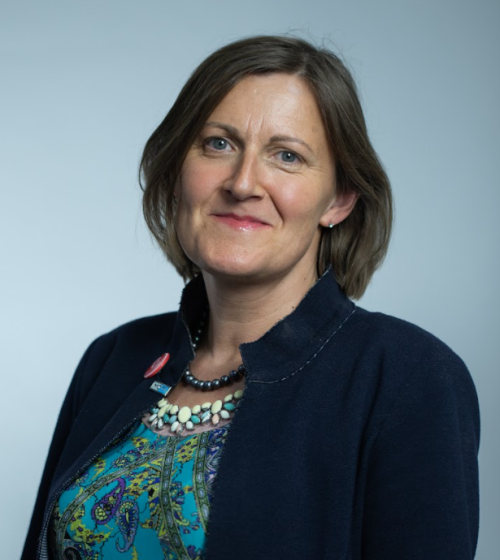
Julie leads regulatory and government relations for Yoti digital identity platform; developing policy approaches for fraud prevention and safeguarding, liaising with national and sectoral trust frameworks, in conjunction with Yoti's internal and external ethics boards.
Julie represents Yoti at numerous fora including the World Economic Forum Digital Identity Innovators; techUK Public Sector, Data Ethics and Digital Identity Boards, ADA Citizens Biometric Council Oversight Board, the All Party Parliamentary Group for Digital Identity, the Sprite + Network - Security, Privacy, Identity, and Trust Engagement Network, Strategic Advisory Board of the EPSRC programme ‘INTUIT: Interaction Design for Trusted Sharing of Personal Health Data to Live Well with HIV’ and the EU SHERPA Stakeholder Board - looking at the combination of artificial intelligence and big data analytics and their impact on ethics and human rights issues.
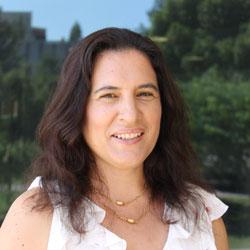
Katina Michael BIT, MTransPriv, PhD is a professor at Arizona State University, a Senior Global Futures Scientist in the Global Futures Laboratory and has a joint appointment in the School for the Future of Innovation in Society and School of Computing and Augmented Intelligence. She is the director of the Society Policy Engineering Collective (SPEC) and the Founding Editor-in-Chief of the IEEE Transactions on Technology and Society. Katina is a senior member of the IEEE and a Public Interest Technology advocate who studies the social implications of technology.
She began her career in industry working in management information systems in 1994 at OTIS Elevator Company, followed by Andersen Consulting, and then as a pre-sales telecommunications engineer until 2002. She was employed as a Professor at the University of Wollongong from 2002 till 2018, and was the Associate Dean International for the Faculty of Engineering and Information Systems overseeing 8 twinning and partner programs throughout Asia and the Middle East. Katina has consulted to various government agencies in both a paid and unpaid capacity, and holds several positions on boards, including the Council on RFID, IEEE SSIT, the Australian Privacy Foundation and previously was a member of the Consumer Federation of Australia. She has been funded by the National Science Foundation and the Australian Research Council for research into citizen-centered smart city design, adaptive AI training systems, and location-based services. Katina has held 14 annual workshops in the social implications of national security space and chaired 3 international symposia on technology and society (ISTAS) in Wollongong, Toronto and Phoenix.
Katina is the Senior Editor of the socio-economic impact section in IEEE Consumer Electronics Magazine and was the editor in chief of the award-winning IEEE Technology and Society Magazine. In 2019 she took on the role of working group chair for the IEEE 2089 standard. In 2020 she received the ICTO Golden Medal for lifetime achievement award for exceptional contributions to research in information systems, and the IEEE Phoenix section’s Outstanding Member Contributing to Global Humanitarian Projects Award for her contributions to a better understanding of the impact of emerging technologies on humanity. In 2017, she also received the Brian M. O'Connell Society on the Social Implications of Technology (SSIT) Distinguished Service Award.
www.katinamichael.com
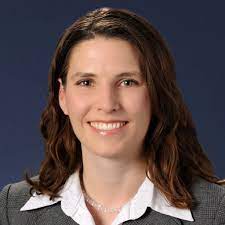
As Global Market Affairs & Community Engagement Director for IEEE-SA, Ms. Patterson oversees key initiatives related to digital inclusion and identity, data governance, and children’s online experiences. She has managed strategic initiatives and policy engagements in Europe and Africa and engaged in capacity building activities. In her role, Ms. Patterson has facilitated dialogue among various stakeholders (industry, government, academia, and social impact bodies) on ICT technology and the intersection of technology and policy, and worked in multi-stakeholder environments across various technical domains and industry sectors. By promoting standards’ potential to support sustainable development and to address digital challenges, Ms. Patterson contributes to IEEE’s mission of advancing technology for the benefit of humanity. The IEEE-SA is a globally-recognized standards-setting body that develops consensus standards through an open process that engages industry and brings together a broad stakeholder community. The IEEE-SA has a portfolio of over 1,200 active standards and more than 650 standards under development. Ms. Patterson has been employed by the IEEE-SA since 2007. Ms. Patterson holds a B.A. in Political Science (Comparative Politics) from Western Washington University and an M.A. in Political Science (Comparative Politics, Developing Countries) from McGill University.
-
 C4. Capacity building
C4. Capacity building
-
 C6. Enabling environment
C6. Enabling environment
-
 C10. Ethical dimensions of the Information Society
C10. Ethical dimensions of the Information Society
-
 C11. International and regional cooperation
C11. International and regional cooperation
-
 Goal 3: Ensure healthy lives and promote well-being for all
Goal 3: Ensure healthy lives and promote well-being for all
